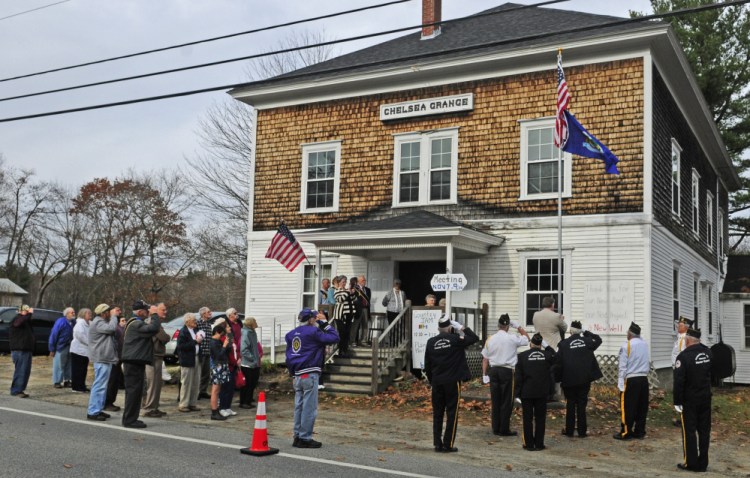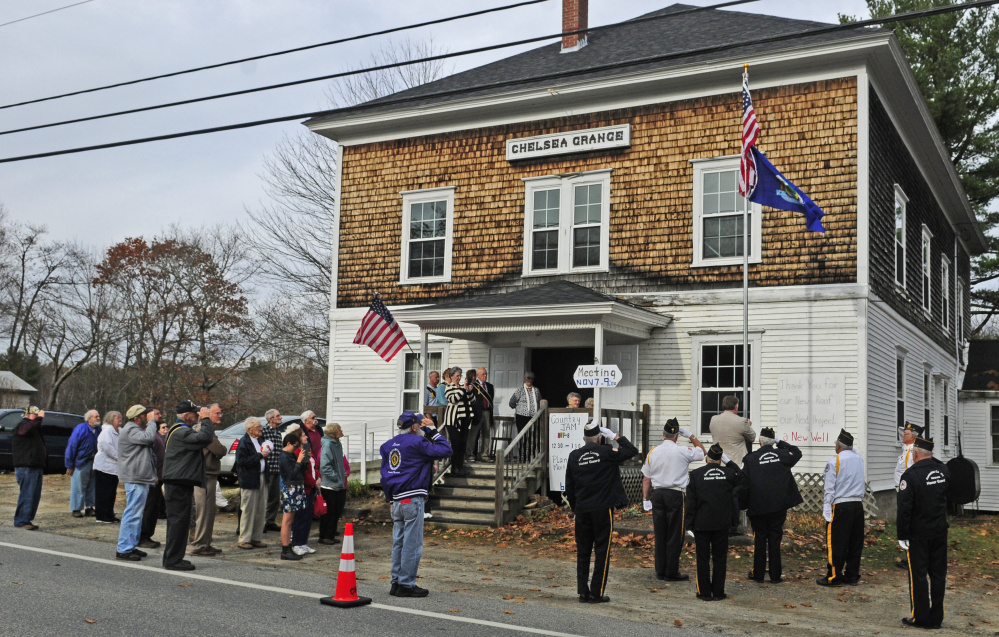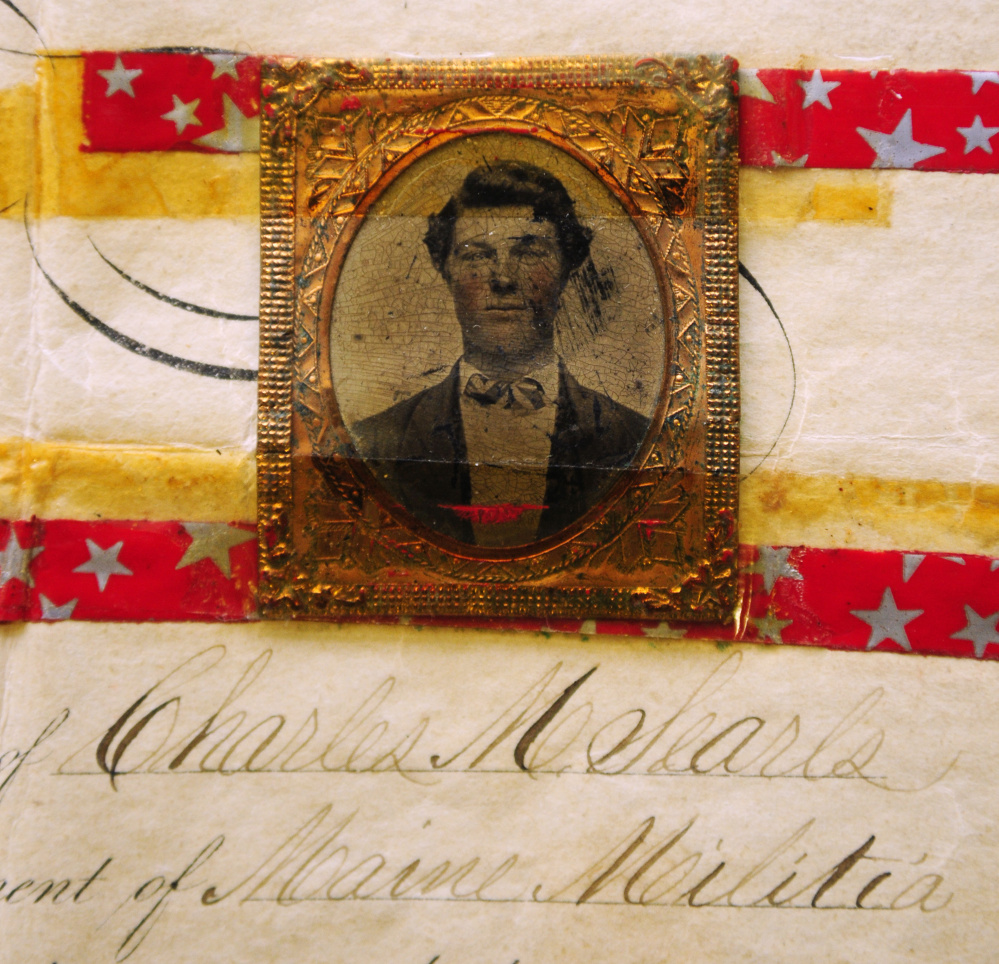CHELSEA — Charles Searls knew the risk every time he picked up a flag and waved it high on the front lines, serving as a reminder of what the men were fighting for. Searls, who was killed in Civil War action on May 27, 1863, in fighting at Port Hudson, Louisiana, wrote about the danger and his willingness to face it in a poem he composed some months before his death.
“A word to my mother, one word for her joy, may banish her sorrow, fill her with joy,” Searls wrote. “Oh! Do not be weeping, for gladly I go, waving my banner in the face of the foe.”
Those words echoed down through the corridors of history Saturday when Searls poem was read again — this time not by a grieving mother, but by a descendant, Tim Morgan, who recited the verses as part of a ceremony to dedicate a flagpole outside the Chelsea Grange in Searls’ honor.
Another descendant, Elmore Morgan, of West Gardiner, asked to put up the flagpole at the Grange hall on Togus Road because he didn’t want Charles Searls’ sacrifice to be forgotten, Chelsea Grange member Kay Khalvati said.
Veterans from throughout the area, including Marine veteran Tim Morgan, took part in Saturday’s dedication and then were honored for their service during a separate ceremony. Roughly a dozen veterans were invited to talk about their experiences in the military, which ranged from World War II to the war in Iraq. Joyce Fessenden peppered the ceremony with military and patriotic songs flawlessly keyed out on the piano.
Tim Morgan, accompanied by the Kennebec County Veterans Honor Guard, helped unfurl and raise both the American and Maine state flags after Morgan read all of the poem Searls wrote about his job as a color guard for the 21st Maine Infantry Regiment Company K. He was just 19 when he was shot in the chest an seriously wounded. He died two weeks later. “The bravest of the brave,” said descendant Alton Morgan, who still holds the letters Searls wrote home to his mother.
Morgan talked about what is in those letters, which describe terrible conditions and longing for home.
Searls, who was 19, and his 42-year-old stepfather both volunteered to join the 21st Maine Infantry regiment, Alton Morgan said. The 21st was trained at Camp Keyes in Augusta, which it left in October 1862. The soldiers boarded a steamer, the Commodore, in Boston, bound for New York.
“On their way, a young soldier came down with the measles,” Alton Morgan said. “The measles haunted the regiment for a long time.”
The men went briefly to Washington, D.C., before they were ordered back to New York.
“The Maine men were not seasoned to march in heavy marching order and were wearied about their 6-mile march,” Alton Morgan said. “Upon arrival at the camp, the autumn rains had softened the ground to a muddy mixture and were covered by putrid pools of the vilest filth.”
The soldiers of the 21st were treated well by local citizens, who brought food and cared for the sick, but that would soon change. In January 1863, member of six companies, including Morgan’s, were taken to the sailing ship Onward, which had been retrofitted, stem to stern, with three tiers of beds 6 feet wide and 7 feet long.
“Four men would sleep across with all their equipment,” Alton Morgan said. “Ventilation was at a premium. You can just imagine the scene with hundreds of seasick men and the stifling atmosphere with odors indescribable.”
Searls, who was now a corporal, was sick for five days. He landed in Baton Rouge and described the scene in a letter to his mother. There were about 20,000 troops.
“The rebels are encamped nearly five miles from here,” Searls wrote. “Their pickets and ours have exchanged quite a number of shots.” Searls recalled a hunting trip the officers took, during which they shot a cow. The officers were skinning the beast when they saw the cavalry coming. They thought it was the rebel cavalry. “They left their beef and ran and not stop until they got inside the guard,” Searls wrote. “The cavalry they saw were Massachusetts troops on a scouting expedition. So much for the brave officers of the 21st.” Searls’ letters display frustration with other leaders and concern for the sick.
“The food is very good but the water comes form the river,” Searls wrote. “
His final letter, dated May 16, 1863, reports that all the forces have gone to Port Hudson except for Searls’ brigade, which was left to guard the city. Gunboats fired on Port Hudson for 10 nights.
“They have done considerable damage,” Searls wrote. “The land forces have not attacked them, but expect to do so in a few days.
Searls was shot 11 days later and was dead before summer began.
“Should death be my portion, a comrade of mine, will bear on the flag I am forced to resign,” Searls wrote in the final stanza of his poem. “Yes, for God and my country, I gladly will go, to bear on my flag in the midst of the foe.”
Craig Crosby — 621-5642
Twitter: @CraigCrosby4
Copy the Story LinkSend questions/comments to the editors.







Success. Please wait for the page to reload. If the page does not reload within 5 seconds, please refresh the page.
Enter your email and password to access comments.
Hi, to comment on stories you must . This profile is in addition to your subscription and website login.
Already have a commenting profile? .
Invalid username/password.
Please check your email to confirm and complete your registration.
Only subscribers are eligible to post comments. Please subscribe or login first for digital access. Here’s why.
Use the form below to reset your password. When you've submitted your account email, we will send an email with a reset code.